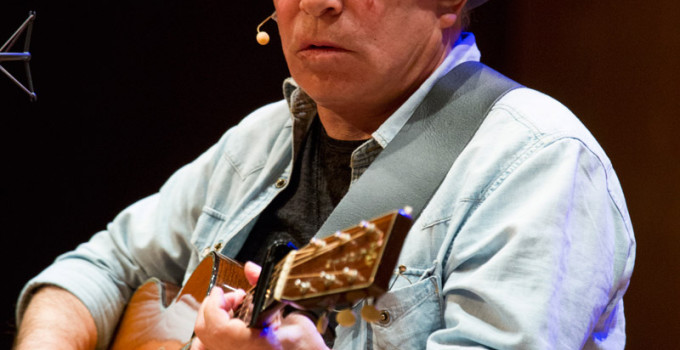Grammy Award-Winner Paul Simon Discusses Songwriting With Paul Muldoon


AN AMERICAN MUSIC ICON: Paul Simon surprised the audience of over 800 Princeton University students, faculty, and staff with a performance of “The Sound of Silence.” Simon joined poet Paul Muldoon for a discussion of musical influences past and present, citing musicians like the Everly Brothers and Ladysmith Black Mambazo (Photo by Denise Applewhite)
Internationally renowned singer-songwriter Paul Simon visited Princeton University recently to talk about his career and his most recent work in a discussion facilitated by Pulitzer Prize-winning poet and Princeton Professor Paul Muldoon. The Grammy award-winning artist also offered an impromptu performance to a capacity audience of over 800, mostly made up of students and joined by faculty and staff at Richardson Auditorium on the Princeton campus. The event was presented by the Lewis Center for the Arts’ Performance Central.
In a relaxed conversation with Muldoon, Simon discussed a range of topics including his most recent work, his early influences, the current state of the music industry, and the challenges artists face in today’s world. He also took questions from Princeton students in the audience.
When asked about his earliest musical influences he noted the doo-wop groups of the 1950s, Elvis Presley, and particularly the Everly Brothers, saying he was in awe of Phil and Don Everly as a teen, calling them the best-sounding duo he had ever heard. He recalled a 2003 concert in which he and Art Garfunkel, reunited for a world tour, invited the Everly Brothers to come out of retirement to be guest performers.
In talking about his most recent musical endeavors, Simon described his current interest in the work of 20th-century composer Harry Partch, who composed microtonally, closely looking at the range within each note. Partch contended the western scale of 12 notes in an octave was actually 36 notes and did not fully represent the range of notes. Partch invented instruments to play microtonal intervals. Simon had an opportunity to play and record with these instruments for the new songs he is working on. He played a recording of one of these new songs, “The Insomniac’s Lullaby.”
When asked about the prospects for a young songwriter starting out today, Simon noted the challenges of the current economics of the music business. “We are living in an anti-art age,” he explained. “The world is now a brutal place and obsessed with speed and wealth.” He noted the biggest problem with the music industry today is that it is more about the packaging of the artist controlled by a small number of large corporations. There are a few huge stars but many talented, struggling artists. However, he believes this will change, predicting the industry will see a shift similar to the one that occurred in the 1960s, ushered in by the young people studying music today. His best advice to budding songwriters: work hard; there are no shortcuts.
Simon also expressed concern about the growing financial resources spent on presidential campaigns in the U.S., with those processes being heavily influenced by a very small group of extremely wealthy individuals. He observed that artists have valuable perspectives on life, but politicians don’t ask artists for their opinions on important issues. He recalled that when he was working on the album Graceland in South Africa, the artists and musicians with whom he collaborated had the best understanding of South African politics. When asked what it was like working on Graceland with Ladysmith Black Mambazo, he said, “It was one of the great learning experiences of my life.”
Princeton’s oldest a cappella group, The Nassoons, opened the event with a performance of a medley of songs from Simon’s album, Graceland.
Prior to the public talk, Simon visited a creative writing/music course taught by Muldoon, “How to Write a Song.” In this popular course, Muldoon leads students with varied backgrounds in music and creative writing in the creation of new songs. Working in small teams, the students are asked to compose music and write lyrics each week that respond to such emotionally charged themes as contempt, gratitude, revenge, desire, disgust, joyousness, remorse, loneliness, despair, and defiance. Simon is the most recent in a series of guest artists who have joined Muldoon and the 26 enrolled students throughout the semester. He spent three hours with the students earlier that afternoon, listening to and critiquing the songs the songwriting teams had created that week. The students will perform songs from the course in a public concert at the end of the semester.
During his distinguished career, Simon has been the recipient of many honors and awards including 12 Grammy awards, three of which (Bridge Over Troubled Water, Still Crazy After All These Years, and Graceland) were for Albums of the Year. In 2003 he was given a Grammy Lifetime Achievement award for his work as half of the duo Simon and Garfunkel. He is a member of The Songwriters Hall of Fame, a recipient of the Hall of Fame’s Johnny Mercer Award, and is in the Rock n’ Roll Hall of Fame as a member of Simon and Garfunkel and as a solo artist. His song “Mrs. Robinson” from the motion picture The Graduate was named in the top ten of The American Film Institute’s “100 Years 100 Songs.”
To learn more, visit http://arts.princeton.edu.
———

